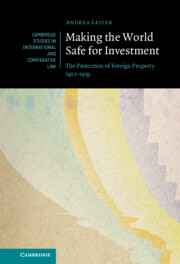Book contents
- Making the World Safe for Investment
- Cambridge Studies in International and Comparative Law: 178
- Making the World Safe for Investment
- Copyright page
- Dedication
- Contents
- Preface and Acknowledgments
- Prologue
- 1 Making the World Safe for Investment
- 2 The Palestine Railway Arbitration 1922
- 3 The Lena Goldfields Arbitration 1930
- 4 The Sheikh of Abu Dhabi Arbitration 1951
- 5 The Abs–Shawcross Draft Convention 1959
- 6 Conclusions
- Bibliography
- Index
- Cambridge Studies in International and Comparative Law: 178
3 - The Lena Goldfields Arbitration 1930
Published online by Cambridge University Press: 23 February 2023
- Making the World Safe for Investment
- Cambridge Studies in International and Comparative Law: 178
- Making the World Safe for Investment
- Copyright page
- Dedication
- Contents
- Preface and Acknowledgments
- Prologue
- 1 Making the World Safe for Investment
- 2 The Palestine Railway Arbitration 1922
- 3 The Lena Goldfields Arbitration 1930
- 4 The Sheikh of Abu Dhabi Arbitration 1951
- 5 The Abs–Shawcross Draft Convention 1959
- 6 Conclusions
- Bibliography
- Index
- Cambridge Studies in International and Comparative Law: 178
Summary
This chapter follows the Lena Goldfields Arbitration of 1930 and examines the legal practices deployed by the parties and the tribunal in their relation to the internationalisation of concession agreements. The tribunal was constituted after a dispute arose between a British company and the Soviet state over the fate of a concession agreement granted in 1925 concerning goldmines in Siberia, and it is the only international arbitration the Soviet Union ever participated in. The chapter takes as a starting point that the socialist revolution in the Soviet Union led to a fundamental change in the structure of the legal order, especially with regard to property rights. Instead of private individual ownership, Soviet law prescribed collectivised state ownership. The chapter argues that the tribunal elevated the jurisdiction over the Lena Goldfields concession agreement to the international level in order to override the application of socialist Soviet law. This elevation was achieved by relying on legal techniques concerning the competence of the arbitral tribunal and the applicable law to the concession agreement. While the Soviet Union maintained that the dispute was a matter of domestic jurisdiction, the company and the tribunal claimed the jurisdiction of an international legal order.
- Type
- Chapter
- Information
- Making the World Safe for InvestmentThe Protection of Foreign Property 1922–1959, pp. 50 - 73Publisher: Cambridge University PressPrint publication year: 2023

